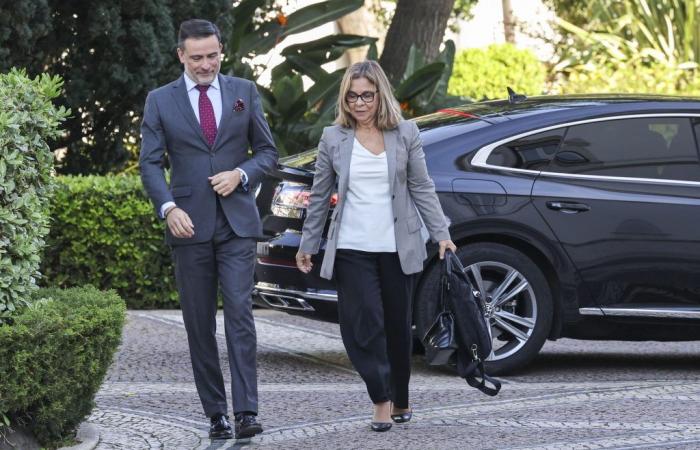The new Minister of Health, Ana Paula Martins, receives on the morning of Friday, the 26th, the National Federation of Doctors (FNAM) and the Independent Union of Doctors (SIM) for the first time. In the call notice, the subject explained that it was a meeting for “listening/negotiation” and that is exactly what both structures want, that this meeting can begin a negotiation process, “transparent”, “competent” and “without games behind the scenes”, argues the president of FNAM, Joana Bordalo e Sá, to DN, recalling that “the way of negotiating under the previous tutelage was a problem and the form is important”. “We are going in good faith and we really hope that a negotiation process will begin, but we don’t know if that will happen. But with us, negotiations have to be with everything on the table, there cannot be meetings without minutes”, she argues.
The negotiation process with the PS Government reached 19 months. It began with minister Marta Temido in April 2022, and it was possible to reach a negotiating protocol two months later, but in September of that year negotiations were resumed with Manuel Pizarro’s team, who dragged them on for more than a year, ending in December 2023, with the government already under management, after the dismissal of António Costa, with an interim agreement only with one of the class unions, SIM, but which allowed increases of 12% to 15% for the class.
But both unions are optimistic for this first meeting. To DN, Joana Bordalo e Sá says: “We are going to bring a set of proposals, only one of which concerns the issue of remuneration, all the others have to do with working conditions that we believe can attract and retain more doctors in the National Health Service. Health (SNS)”.
Nuno Rodrigues, secretary general of SIM, also explained: “We will bring proposals that can be achievable in the short and medium term, because there are problems that need to be resolved now, which come from previous legislatures in which no agreement was reached, and others that we consider can be included in the Health Emergency Plan, but our objective is that these proposals increase the Portuguese people’s access to health care”.
For FNAM there are “10 points that are fundamental for an understanding with the Government”. The objective is to “urgently resolve the crisis in the NHS”, renegotiating the medical career and retaining doctors in the NHS to “guarantee the provision of healthcare to the population”.
These include “the replacement of the normal weekly working period of 35 hours and the updating of the salary scale”, a demand that comes from behind and that Joana Bordalo e Sá argues is a “question of justice in relation to other professionals in the sector”. Public administration”.
“Doctors are the only ones who work 40 normal hours, apart from the overtime that we know we are subject to. There are many colleagues who leave the SNS because they cannot handle these hours. Therefore, this point is very important, we are sure that returning at 35 hours would attract more doctors to the SNS”.
Another issue that they consider important and which, they say, “has no budgetary impact” is the “reinstatement of the Medical Internship as a category for entry into the Medical Career”.
The president of FNAM even says that this measure would also allow many of the specialists not to abandon public service as soon as they graduate. Others follow, such as “implementing progression in remuneration positions in each category and streamlining competitions; the replacement of 25 working days of vacation per year and 5 additional days of vacation, if taken outside the peak season; the possibility of retirement or early retirement for doctors with 36 years of service or at 62 years of age without penalties, taking into account the hardship, rapid wear and tear of the medical profession; normal work in the Emergency Service for a single weekly period of up to 12 hours maximum”. And also the guarantee that “the current list of users per family doctor will be considered and complied with, with a maximum limit of 1917 units or 1550 users, depending on which is reached first”.
The FNAM also considers as fundamental “the revocation of the diplomas of the Local Health Units (ULS), Full Dedication and respective annexes of the USF and CRI”, which were approved last September without the agreement of the unions.
Finally, and as it had already announced, this union structure also defends “the autonomy of the legal regime for the organization and functioning of the USF in a specific diploma with immediate revocation of the Team Performance Index and the User Complexity Index, specific activities and weighting the list by age group”.
Joana Bordalo e Sá reinforces that “these measures are related to working conditions and that for doctors they mean the possibility of reconciling professional and personal life, as well as career advancement and appreciation”. Therefore, now “it is in the hands of the Government and the new minister to express openness to welcome them”.
Nuno Rodrigues from SIM also says that what he expects from this new guardianship “is that it has the desire to solve problems and the capacity for dialogue, managing to enforce Health priorities within the government”, adding that “it is necessary to look at the results of elections and realize that the Portuguese voted the way they did because certain issues were not working and one of them is access to healthcare. The numbers speak for themselves, we have 1.5 million users without a family doctor and waiting lists ”.
Both FNAM and SIM agree that this guardianship must have time to analyze and negotiate, but “it is not an unlimited amount of time”, it has to “be an acceptable amount of time, especially because summer is coming and there are problems to solve, such as that of emergencies”, highlights Joana Bordalo e Sá. “We continue to have a huge shortage of doctors and the constraints are not a normal or expected situation, we cannot get used to this. They have to be resolved,” she argued.
Now, “let’s see how open the other side is to discussing and resolving problems”, representatives of the two unions commented to DN.
Tags: Doctors unions transparent competent negotiations ministry
--





